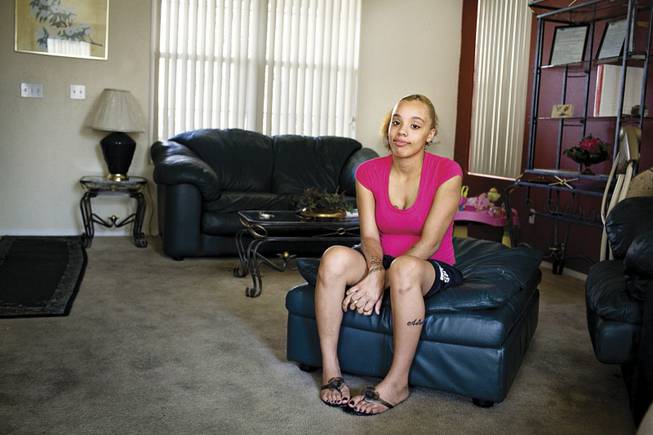
Brandice Dirden, 17, is back in school thanks to a program for teenage girls who are homeless or from unstable backgrounds that allowed her to attend summer school and get on the job training. She has a year-old daughter and hasn’t been in school since she was kicked out of sixth grade for fighting.
Saturday, Sept. 5, 2009 | 2 a.m.
Beyond the Sun
Seventeen-year-old Brandice Dirden lifts her brown eyes from the floor and lets a wide smile cross her face twice during an hourlong conversation.
It’s when she mentions getting A’s and B’s in summer school, and landing a job interview at Marshalls, the store where she has been learning about the world of work since July.
As of last week, Dirden is also one of more than 2,200 students filling the classrooms of Shadow Ridge High School, where she often feels out of place because she is one of the few students with a baby at home and because it has been so hard for her to get this far.
When she started school a week ago Monday, it was the first time she had set foot in a classroom in four years. She was thrown out of sixth grade for fighting, shortly after her “only friend in the world,” her grandmother, died.
Gangs, shoplifting, an arrest for battery and an unplanned pregnancy followed.
Luckily for Dirden, Toni Mims took an interest in her. At the time, Mims worked with an out-of-school tutoring program at Nevada Partners, so she led Dirden into tutoring several times. By this year, Mims was working with Southern Nevada Children First, the only nonprofit organization in Las Vegas focusing on teenage girls who have been homeless or come from unstable backgrounds and are pregnant or raising children.
Dirden got to the 2-year-old organization just in time to join a summer program paid for by Workforce Connections, an agency that gets federal money to train people for work and help them find jobs. The $124,449 grant allowed Southern Nevada Children First to help 32 girls and young women, ages 16 to 22, get back into school or a GED or technical program. They’re also afforded on-the-job training. The grant-funded effort began July 1 and continues through Sept. 31. The nonprofit organization also has a Las Vegas house where five teenage girls live while rebuilding their lives.
The summer program is “something we need in our community,” according to Henderson Councilwoman Kathleen Boutin, founder of the Nevada Partnership for Homeless Youth. Boutin notes that Nevada has long been at or near the top of the list nationwide for teen pregnancy rates and that unstable housing or homelessness makes being young and raising a child doubly difficult. She adds that a lot of grant money is available to help pregnant teens, but the Las Vegas Valley has few such programs.

Kathleen Boutin
Programs that focus on school and job training are particularly needed to “break the cycle of poverty,” Boutin says.
Dirden is friends with Sa’sha Mason, also in Southern Nevada Children First’s summer program. Mason is 16 and has an 8-month-old daughter. Mason spent a few years “bouncing around,” as she puts it, including sleeping in a friend’s yard.
Monique Harris, executive director of Southern Nevada Children First, says the technical definition of homelessness includes “couch surfing.” To escape from problems at home, some young people sleep on the couch of a friend or acquaintance for a few nights, then move on to another and another.
Harris worked at the Nevada Partnership for Homeless Youth before starting her own organization. Many of the 32 participants in her summer program have had to live at the homes of friends or friends of friends. They’ve often had to move without notice, a precariousness made more difficult with a baby. Some of the girls also have lived on the streets.
Most have also grown up without the feeling “that someone cares,” Dirden says.
“In a way, we’re replacing their parents,” Harris says. “These are kids raising themselves.”
So Harris and her staff coax them back to school, give them rides, help with homework and give pats on the back. The on-the-job training includes basics such as dressing appropriately and good manners.
“They don’t have these skills,” Harris says.
Dirden appears to have benefited from the past few months of learning and working, but her confidence remains fragile. Approaching school on her first day, she was nervous.
“I was afraid people were going to be more advanced,” she says. “I never had anyone to push me and I feel like everyone sets us up as a failure.”
In those moments, she says, “My daughter Aaloni keeps me going.”
She wants a future with her own apartment. She wants to be a nurse. Sometimes, she sees news reports about gang members shot or arrested and she thinks, “I’ve come a long way.”
“I’ve known people who got shot and died. That could be me.”
Harris, who is seeking funding to replace the Workforce Connections grant when it expires, says the teens “are good girls.”
If you asked them what they need, Harris says, their answer would be, “ ‘Let me get stable. Give me some direction. I’ll meet your expectations.’ ”

Join the Discussion:
Check this out for a full explanation of our conversion to the LiveFyre commenting system and instructions on how to sign up for an account.
Full comments policy